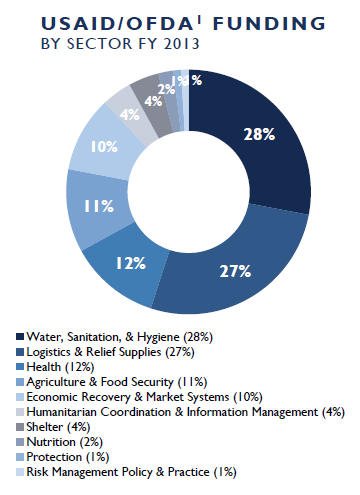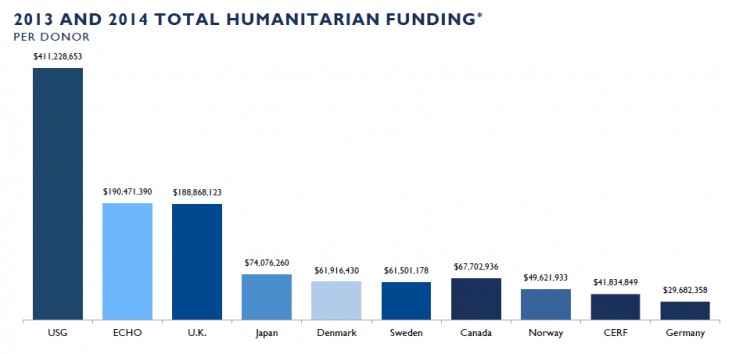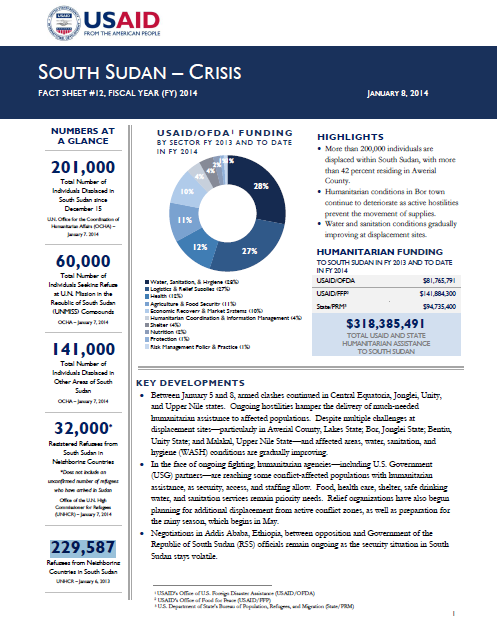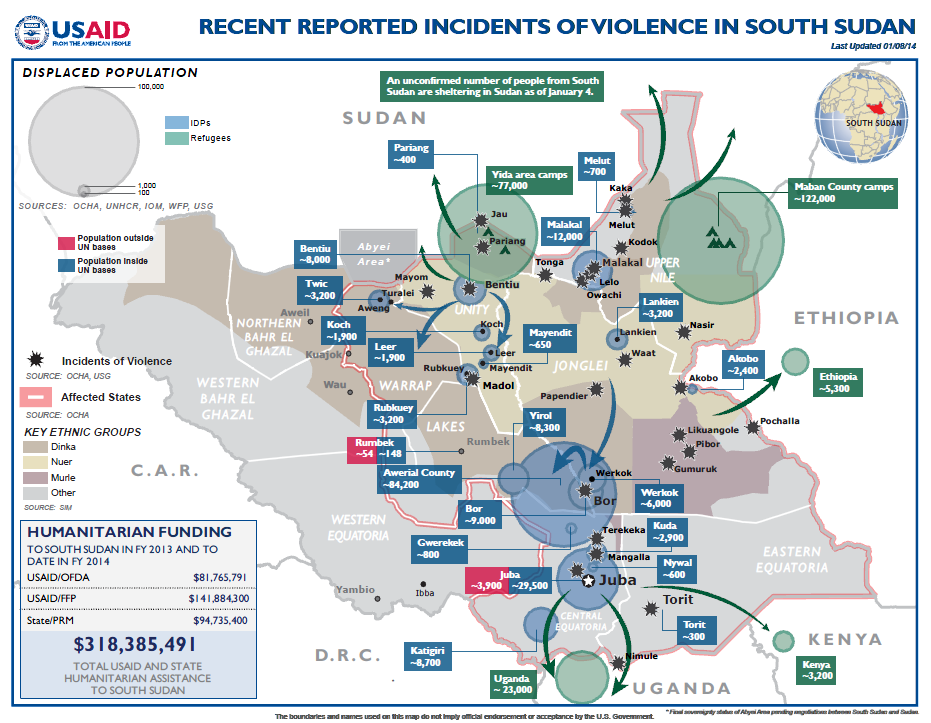- What We Do
- Agriculture and Food Security
- Democracy, Human Rights and Governance
- Economic Growth and Trade
- Education
- Environment and Global Climate Change
- Gender Equality and Women's Empowerment
- Global Health
- Humanitarian Assistance
- Transformation at USAID
- Water and Sanitation
- Working in Crises and Conflict
- U.S. Global Development Lab
Speeches Shim
January 8, 2013
Numbers At A Glance
201,000
60,000
141,000
32,000
229,587
Humanitarian Funding:
To South Sudan To Date In FY2013 and FY2014:

| USAID/OFDA | $81,765,791 |
| USAID/FFP | $141,884,300 |
| State/PRMDoD | $94,735,400 |
| TOTAL | $318,385,491 |
Highlights
More than 200,000 individuals are displaced within South Sudan, with more than 42 percent residing in Awerial County.
Humanitarian conditions in Bor town continue to deteriorate as active hostilities prevent the movement of supplies.
Water and sanitation conditions gradually improving at displacement sites.
KEY DEVELOPMENTS
Between January 5 and 8, armed clashes continued in Central Equatoria, Jonglei, Unity, and Upper Nile states. Ongoing hostilities hamper the delivery of much-needed humanitarian assistance to affected populations. Despite multiple challenges at displacement sites—particularly in Awerial County, Lakes State; Bor, Jonglei State; Bentiu, Unity State; and Malakal, Upper Nile State—and affected areas, water, sanitation, and hygiene (WASH) conditions are gradually improving.
In the face of ongoing fighting, humanitarian agencies—including U.S. Government (USG) partners—are reaching some conflict-affected populations with humanitarian assistance, as security, access, and staffing allow. Food, health care, shelter, safe drinking water, and sanitation services remain priority needs. Relief organizations have also begun planning for additional displacement from active conflict zones, as well as preparation for the rainy season, which begins in May.
Negotiations in Addis Ababa, Ethiopia, between opposition and Government of the Republic of South Sudan (RSS) officials remain ongoing as the security situation in South Sudan stays volatile.
SITUATION AND DISPLACEMENT UPDATE
Of the more than 200,000 people displaced throughout South Sudan, approximately 85,000 are reportedly displaced in Awerial County, according to the U.N. In addition, relief agencies have reported that at least 2,500 people have received treatment for gunshot wounds in health facilities countrywide since insecurity began in mid-December.
Most recently, fighting south of Bor in Jonglei State triggered additional displacement and casualties, including more than 20 people transported to health facilities in the area. OCHA reports that humanitarian conditions in Bor continue to deteriorate, particularly available medical supplies, as fighting prevents the movement of people and goods. Hostilities also occurred in Unity State’s Mayom and Pariang counties and Baliet County in Upper Nile State.
Between January 4 and 5, fighting erupted once more in Juba, including an incident of gunfire in the UNMISS Tong Ping base, resulting in injuries to seven people. Despite tensions, security conditions in Juba, Central Equatoria State, returned to a calmer state by January 7, the U.N. reports.
As of January 7, at least 32,000 South Sudanese refugees had arrived in Uganda, Ethiopia, and Kenya, with an unconfirmed number of refugees arriving in Sudan, according to the U.N.
South Sudan Crisis Fact Sheet #12 January 8, 2014 ![]() (pdf - 405k)
(pdf - 405k)
HUMANITARIAN RESPONSE IN JUBA, CENTRAL EQUATORIA STATE
Registration efforts in Juba continue, with the International Organization for Migration (IOM) registering 6,634 people at U.N. House 3 as of January 7, bringing the total number of registered internally displaced persons (IDPs) at the two UNMISS bases in Juba—Tong Ping and U.N. House 3—to more than 24,000 IDPs.
USAID/FFP partner U.N. World Food Program (WFP) continued a second round of food distributions in U.N. House 3, reaching more than 3,450 people as of January 7. WFP is also distributing high-energy biscuits at U.N. House 3, targeting children under five years of age and new arrivals. WFP will begin second round distributions in the UNMISS Tong Ping base in the coming days.
As of January 7, reproductive health services continued through relief organizations operating in the two Juba UNMISS bases, with 61 deliveries reported.
To date, relief organizations have identified 174 unaccompanied children in the Juba UNMISS bases and reunited 17 with their families. Case managers have arranged foster care for 65 accompanied children, OCHA reports. In addition, 72 children were documented as missing, 11 of whom have been found and reunified with their parents.
South Sudan Crisis Map #12 January 8, 2014 ![]() (pdf - 423k)
(pdf - 423k)
HUMANITARIAN NEEDS AND RESPONSE IN OTHER AREAS OF SOUTH SUDAN
Hostilities in and around Bor continued on January 7, restricting humanitarian access to populations in need amid reported food and medical supply shortages at the UNMISS base sheltering conflict-affected IDPs. OCHA reports that food commodities and nutritional supplements—including super-cereal and sorghum—retrieved from the WFP warehouse during a lull in fighting on January 3 have reached approximately 850 families and more than 1,000 children under five years of age in the Bor UNMISS base. A humanitarian team remains on stand-by to deploy to Bor as soon as security permits.
International media report that civilians fleeing Bor are paying $30 to $40 dollars to cross the White Nile River to Awerial County, causing some parents to send only their children to safety out of an inability to afford transport for all family members. Save the Children reports that approximately 1,000 people are arriving in Awerial each day, estimating that 60 percent of the displaced in Awerial are children. Approximately 8,300 people are displaced in and around Yirol town, due to fighting, and are in need of food items and other relief commodities, as well as WASH support, according to OCHA. Relief organizations are also working to provide emergency food assistance to these IDP populations.
Humanitarian organizations remain concerned regarding WASH conditions in Awerial, as displaced populations are currently receiving less than one liter of safe drinking water per day. Relief organizations have installed two surface water treatment systems, distributed water purification sachets to approximately 960 families, and are crafting a borehole drilling strategy to increase access to safe drinking water.
Ongoing fighting in Unity State continues to force civilians to flee to Warrap State. The number of people sheltering at the UNMISS base in Pariang, Unity State, has decreased from 3,000 to 400 in recent days.
The humanitarian situation in Bentiu, Unity State, is improving due to increased access to safe drinking water and sanitation services resulting from humanitarian interventions. As of January 7, relief organizations had distributed 655 kitchen sets, 600 plastic sheets, 600 mosquito nets, 350 sleeping mats, 1,000 water containers, and more than 25,000 bars of soap to IDPs in the UNMISS Bentiu compound.
Malakal town in Upper Nile State remains relatively calm, although clashes in other areas, including Baliet County, continue. Relief organizations recently provided relief items, including blankets and mosquito nets, to people sheltering in the UNMISS compound in Melut. Approximately 12,000 IDPs remain at the Malakal UNMISS base and received food and WASH assistance from relief organizations.
2013 TOTAL HUMANITARIAN FUNDING*

*Funding figures are as of January 8, 2014. All international figures are according to OCHA’s Financial Tracking Service and based on international commitments during the 2013 and 2014 calendar years, while USG figures are according to the USG and reflect the most recent USG commitments based on the 2013 fiscal year, which began on October 1, 2012, and ended September 30, 2013, as well as the 2014 fiscal year, which began on October 1, 2013.



Comment
Make a general inquiry or suggest an improvement.